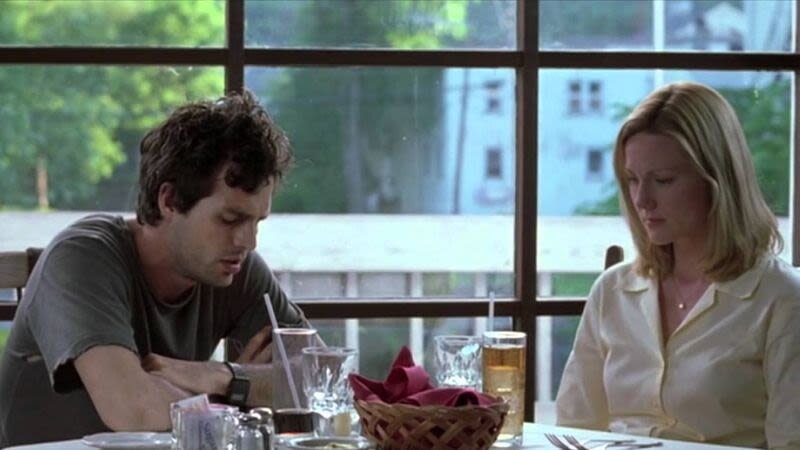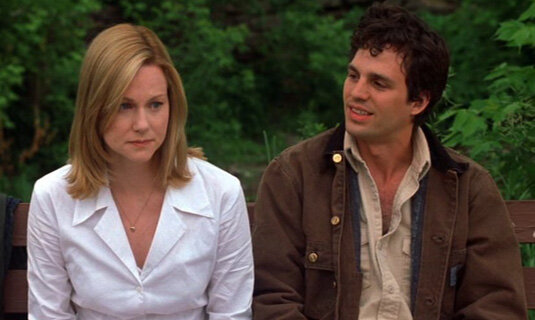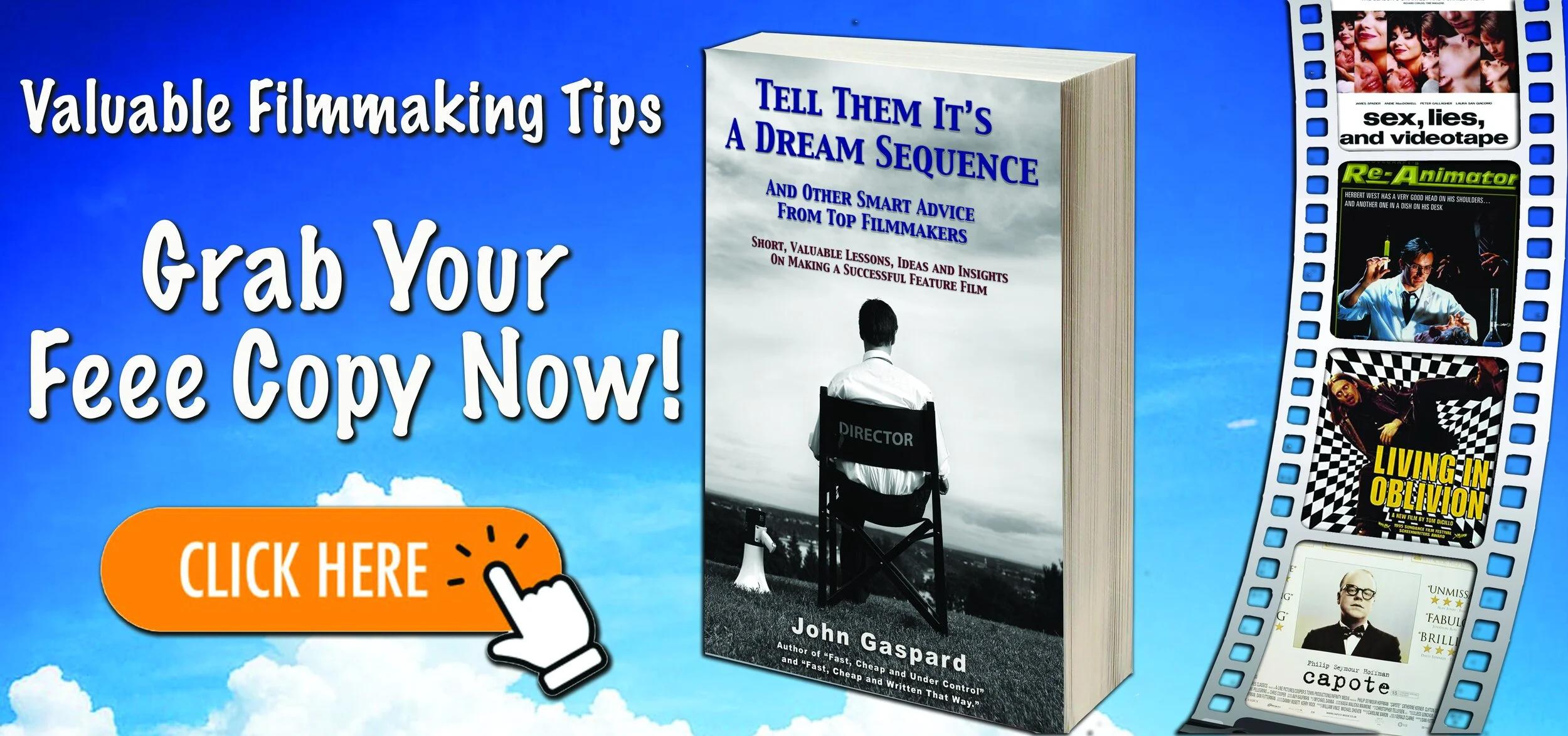Kenneth Lonergan found success writing screenplays for Hollywood (Analyze This, The Adventures of Rocky & Bullwinkle, and Martin Scorsese’s Gangs of New York), but he finds satisfaction writing for the theater, where he is able to control what happens to his script.
He maintained that same level of control on his first film as writer/director, You Can Count on Me, which was nominated for an Academy Award for Best Screenplay, won the Sundance 2000 Grand Jury Prize and the Waldo Salt Screenwriting Award, the New York Film Critics Circle, the Los Angeles Film Critics Circle, and Writers Guild of America and National Board of Review awards for Best Screenplay of 2001.
What was going on in your career before You Can Count on Me?
KENNETH: I was making a living writing screenplays, doing pretty well, but my main interest was playwriting, which I was doing mostly with the Naked Angels theater company. I had just had my first big break in playwriting, with my play This Is Our Youth. It was very well received, and it bumped me several levels up instantly, which is very unusual. So, I had just become an off-Broadway playwright with some cachet and I was already basically a Hollywood screenwriter of comedies.
Why do you use the label "screenwriter of comedies" and not just "screenwriter"?
KENNETH: Because I started out doing comedies and they don't let you do anything that you haven't already done. You send them five dramas and they'll say, "But these are plays." They can't extrapolate. It's like the Supreme Court. There has to be a very clear precedent, or you have no argument at all.
Where did the idea for You Can Count on Me come from?
KENNETH: It came from an assignment that my theater company had given. We were doing an evening of short plays based on the subject of faith and I was poking around for something to write on that topic. I had the idea of this brother and sister. I wrote a ten-minute scene with these characters, which basically was the first step in writing the screenplay. But whenever I say that, I then read that "He adapted it from his own play." But it was, honestly, twelve pages long and it was never meant to be a full-length play. As soon as I thought of it as a larger piece it was immediately a screenplay.
And that scene is still pretty much intact, right, as the first scene where Terry and Sammy meet in the restaurant?
KENNETH: It's that plus the scene at the end. Literally. Minus the note of hope that he expresses when he tries to tell her that he's not going back into the toilet, he actually liked being in Alaska and maybe there's something there for him. Some people have interpreted the movie as him going back into the depths, while other people have noticed that he actually is a tiny bit of a step up from where he started.
What was it about those twelve pages that made you think you had the beginnings of a feature script?
KENNETH: I loved the characters a lot and I thought the scene was really very good. And when it was performed it was performed really nicely. I just thought there was something very moving about the situation.
I guess I liked the idea of how crazy she was about him and the whole dynamic of her having more faith in him than he had in himself. Even though she's a little misguided about him, just liking him that much brought him up a little bit. And I liked the idea that they were at such cross-purposes, but also that they liked each other so much.
Also the idea that they had had this shared tragedy. Her reaction was a sort of blind faith and his reaction was closer to mine, which is that it has no meaning but you have to piece together your own feelings about things like that, because none of the available systems really did it for him.
I just liked that whole dynamic. I liked her taking care of him and him disappointing her -- all the dynamics between them. I just liked the people a lot.
What was the process of finding the rest of that story and getting to that ending point?
KENNETH: It was one of those rare, all-in-one flashes. I was watching a play which had a little kid in it. I was only partly enjoying the play, so my mind was wandering and I suddenly had the thought, "If she had a little boy who her brother got involved with and then disappointed and became a hazard to, that would be a terrible conflict for her." Immediately I saw a whole arc of a story based on that, which seemed to be very full. Shortly after that, everything else just kept kind of falling in place.
Once you had the story, how did you proceed? Did you write an outline?
KENNETH: I almost never do an outline. I've done outlines for assignments and even then I think I've only done them twice. I have nothing against them, I just don't usually work that way.
For You Can Count on Me, I split the lunch scene up, because I knew that the last part of the scene would be the last part of the movie.
I had, at one point, a whole different ending. Originally the last scene was going to be the scene with Sammy and the little boy at the kitchen table. But then, once it was all written, I realized that it should really end with the brother and the sister. So I made that adjustment.
Since you don’t do an outline, do you have other methods of gathering your thoughts before you write?
KENNETH: I take a lot of notes in my little notebook. I try to write down any thought I have about the movie or I'll write a little scrap of a scene in the notebook and I'll always refer back to that. So I ended up taking a lot of notes.
Were you always planning on directing this script?
KENNETH: Yes. I wouldn't have written it if I wasn't planning to direct it.
Did that change the way you wrote it?
KENNETH: Completely. I had been aware of what professional screenwriting was like in Hollywood many years before I got into it. I got into it only to make money, because I knew there was no creative protection.
This was the first screenplay that I ever wrote the way I would have written a play, meaning putting my heart and soul into it. Every other job I'd done, including the spec script for Analyze This, I definitely did as good a job as I could, but I wrote knowing that the script would be destroyed. I wouldn't have written You Can Count On Me if I'd known it would be destroyed. I wouldn't have written it if I wasn't planning to direct it and I knew the only way to protect it was to direct it.
I knew that if it was an independent movie that I would have a fairly good chance of controlling the material. I also knew that I wouldn't do it if I couldn't control the material.
Did you think about budget concerns at all while you were writing?
KENNETH: No, I didn't. There's no call for anything expensive in the story anyway. I might have thought about it a little bit in the periphery of my mind, but not really. I knew it would be cheap.
Did you tweak the script after it was cast?
KENNETH: The only thing I changed in production was I did a little bit of cutting and re-wrote the last scene a little bit, because I felt it wasn't clear what Terry’s feeling was about going away.
How do you know when a script is done?
KENNETH: It feels right. I always feel that the ending must be at least as good as the rest of the movie. If the ending isn't great, I feel like it's not a successful endeavor. And then if there's nothing else that I can work on and improve, then I basically leave it alone. You can always futz around with it, but unfortunately there's a certain point when I start rewriting it where I start making it worse. Thankfully, I think I've learned to identify that point and then I leave it alone.
How do you know when you’ve reached that point of diminishing returns?
KENNETH: When you get out of the groove of it, I really think it's dangerous to mess around with it too much. I tend to rewrite myself a lot as I'm going, but not endlessly.
I find that a lot of writers are too ready to rewrite stuff, which is dangerous because they just get lost instantly. I know I do. New writers are way too eager to take other people's comments and show it to everyone and get all the feedback they can get. The feeding frenzy in the movie culture now -- which is to let everyone dive in and anyone can give notes -- I just find it repellant and very bad for the scripts and ultimately for the audience.
The other thing that writers can do is not be self-critical enough. I think you have to be very much on your own side but be very unflinching about noticing when something's no good. You have to be able to step away and step back, basically trusting your own opinion and hoping that if you like it somebody else will.
You Can Count on Me is a textbook example of writing scenes where we learn things about the characters through their actions and not just their words. How did you achieve that?
KENNETH: I always have the actors in mind and when I'm writing, I act out the scene, which includes the behavior. And if the behavior's covering it, then you don't need a line of dialogue.
The reason that movies stink now is the fixation on everything being clear. Once the studio development people got the idea that they were going to get involved in the emotional lives of the characters is when things really turned to shit, because they have a terror that things won't be clear and they have a list of what every movie has to be about.
I've never been involved in a movie -- except for Gangs of New York -- in which the comment did not come up at some point that "the character has to learn to believe in himself." Every movie has to be about somebody believing in himself and if it's not that, they have to learn that "it's the heart that you want to pay attention to, not the head." That's another one, which is basically the same thing.
These are people who insist that film is a visual medium, while pounding you to death to write this terrible dialogue which basically, in words, says every single thing that the actors should be doing. People just don't say what they mean all the time.
Or they don’t say anything at all. I’m thinking of the scene in You Can Count on Me when Sammy is riding in the car with her on-again, off-again boyfriend. She has a moment where she looks at him and you can tell she’s completely reassessing the relationship, but not a word is spoken about it.
KENNETH: It was very clear that he showed up, he's a good guy, she's been back and forth about him, he's very stoically driving her to get her fuck-up brother out of jail and she sits there and turns and looks at him very thoughtfully. So what are you going to think, except that she's re-evaluating him? Do you need her to say, "You know, Bob, thanks." That stinks.
Plus, she's not sure she wants to do anything about it. She's just re-evaluating. It's a private moment. Do I need to have her call her best-friend and say, "You know, I sat there looking at Bob and thinking, 'You know what ...'" Who needs it? Anybody would look at him and think that, but nobody would say that to him or make that call. And if they did, everyone would cringe with embarrassment.
I wish writers would hold back a little more. You want to make sure that the audience knows what you need them to know at a certain point for the scene to have the effect that you want, but writers often write what they think should happen. If people would write more of what would happen and just see if it took care of itself, I think it would.
You don't really need to know anything about the two characters in the lunch scene to have the scene be interesting, because there's so much evident tension. If this went on for a long time and I never gave you any information, that would seem like a bullshit trick eventually. It's a medium that's meant to be acted and not described and when you start saying the subtext, then there's nothing left to act.
Did you learn anything writing You Can Count on Me that you still use today?
KENNETH: Yes, but I didn't learn it enough. In editing the first cut, I thought every scene was very good but the whole thing dragged. The problem was that every scene had a beginning, a middle and an end. So I chopped the beginnings and, more particularly, the endings off every scene and suddenly the story propelled itself from one scene to the next much better. That's because it didn't have 200 little soft resolves.
So I've been trying to think about writing in sequences instead of scenes, but the truth is I haven't really applied that, because it's very hard for me to judge that on the page. It's something I know can be dealt with in the editing, so I can't say I actually have the faith to write a really short scene.
What's the best advice about writing that you've ever received?
KENNETH: I think it was from Gertrude Stein. I don't remember the quote exactly, but it's someone telling a younger writer who's worried their work is no good. The quote is, "It's not your business whether it's good or bad. Your job is to keep the channel open, because there's only one of you in all of time and if you don't say it, it will never be said. So keep the channel open." I think that is really very, very good advice, because a lot of people sit around fussing whether it's good or not and I personally think that's not really any of your business. It's not helpful.
Is there a real difference between writing for other people and writing for yourself?
KENNETH: Screenwriting for other people is completely different from screenwriting for yourself. I think writers can have more power than they think, if they're keeping it small, but they don't have any power in Hollywood no matter what and every bad thing I described will happen and does. That's all that happens. Occasionally there's an exception.
Dying to make a feature? Learn from the pros!
"We never put out an actual textbook for the Corman School of Filmmaking, but if we did, it would be Fast, Cheap and Under Control."
Roger Corman, Producer
★★★★★
It’s like taking a Master Class in moviemaking…all in one book!
Jonathan Demme: The value of cameos
John Sayles: Writing to your resources
Peter Bogdanovich: Long, continuous takes
John Cassavetes: Re-Shoots
Steven Soderbergh: Rehearsals
George Romero: Casting
Kevin Smith: Skipping film school
Jon Favreau: Creating an emotional connection
Richard Linklater: Poverty breeds creativity
David Lynch: Kill your darlings
Ron Howard: Pre-production planning
John Carpenter: Going low-tech
Robert Rodriguez: Sound thinking
And more!
Write Your Screenplay with the Help of Top Screenwriters!
It’s like taking a Master Class in screenwriting … all in one book!
Discover the pitfalls of writing to fit a budget from screenwriters who have successfully navigated these waters already. Learn from their mistakes and improve your script with their expert advice.
"I wish I'd read this book before I made Re-Animator."
Stuart Gordon, Director, Re-Animator, Castle Freak, From Beyond
John Gaspard has directed half a dozen low-budget features, as well as written for TV, movies, novels and the stage.
The book covers (among other topics):
Academy-Award Winner Dan Futterman (“Capote”) on writing real stories
Tom DiCillio (“Living In Oblivion”) on turning a short into a feature
Kasi Lemmons (“Eve’s Bayou”) on writing for a different time period
George Romero (“Martin”) on writing horror on a budget
Rebecca Miller (“Personal Velocity”) on adapting short stories
Stuart Gordon (“Re-Animator”) on adaptations
Academy-Award Nominee Whit Stillman (“Metropolitan”) on cheap ways to make it look expensive
Miranda July (“Me and You and Everyone We Know”) on making your writing spontaneous
Alex Cox (“Repo Man”) on scaling the script to meet a budget
Joan Micklin Silver (“Hester Street”) on writing history on a budget
Bob Clark (“Children Shouldn’t Play with Dead Things”) on mixing humor and horror
Amy Holden Jones (“Love Letters”) on writing romance on a budget
Henry Jaglom (“Venice/Venice”) on mixing improvisation with scripting
L.M. Kit Carson (“Paris, Texas”) on re-writing while shooting
Academy-Award Winner Kenneth Lonergan (“You Can Count on Me”) on script editing
Roger Nygard (“Suckers”) on mixing genres
This is the book for anyone who’s serious about writing a screenplay that can get produced!














